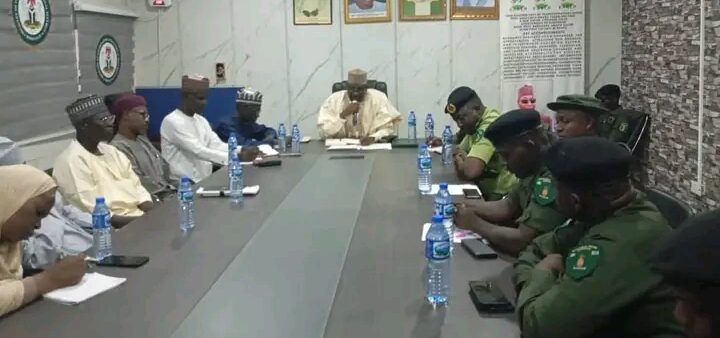In a major step toward boosting cooperation, the Borno State Government and the Chad Basin National Park have agreed to work together more closely on environmental protection, security, and community support.
On Tuesday, Borno’s Commissioner for Information and Internal Security, Professor Usman Tar, welcomed the Park’s head, Mr. Jimoh Bolanle Oladosu, and his team to his office in Maiduguri.
Their meeting focused on finding joint solutions to the region’s twin problems of environmental damage and insecurity.
In a press release obtained by The News Chronicle, Professor Usman A. Tar, a defence and security expert, commended the efforts of Chad Basin National Park in protecting the environment within a conflict-affected region.
He described the task as challenging but essential. Professor Tar also noted that the section of the park located in Borno State spans more than 1,200 square kilometres an area comparable in size to Sierra Leone.
He stressed that both the Park and the state’s security agencies have shared goals, and called for better coordination between them.
He outlined key areas for joint action, including restoring damaged forests, expanding the federal forest guard programme, and using new technologies to stop elephants from damaging farms, a problem that threatens local food security.
Professor Tar revealed that Borno is already training forest guards, especially from local hunters and members of the Civilian Joint Task Force, who know the terrain well.
He called for the federal government to allow more recruitment in Borno because of its large and vulnerable land area.
He also raised concerns about desertification and deforestation, which are worsening due to the insurgency.
The Commissioner invited the Park to join in the state’s large-scale tree planting campaign and to work in line with new environmental laws recently signed by Governor Babagana Zulum.
These laws ban illegal tree cutting and introduce strict penalties for offenders. He urged Park officials to support enforcing these laws.
Professor Tar concluded by asking the Park to submit its requests in writing, promising that the state would address those it could, and refer others to the Governor for action.
Mr. Oladosu said his visit aimed to strengthen ties between the Park and the state government. He highlighted the Park’s rich wildlife, including endangered animals like elephants, lions, giraffes, and zebras.
He mentioned the Rudu-Ma area in Bama as especially important, with potential to become a UNESCO World Heritage Site.
He listed the Park’s past achievements, such as stopping elephant attacks in 2021, helping during the 2024 Maiduguri floods, and supporting security forces through intelligence gathering. The Park also helps with training forest guards and running youth and student programs.
Despite these successes, Mr. Oladosu said the Park faces serious challenges, including lack of vehicles, destroyed facilities, and being left out of state security plans.
He asked the state government for help with patrol vehicles, motorcycles, and housing for staff, and called for the Park to be included in Borno’s wider security strategy.
“We are a key security partner,” he said, praising the Commissioner for his willingness to collaborate.
Mr. Oladosu also shared a brief history of the Park, which was created in 1991 by the Federal Government to protect biodiversity and support environmental sustainability in Nigeria’s Sahel region.
The Park spans Borno and Yobe states and is divided into three sectors: Chingurmi Duguma in Borno, and Yuguda Nguru Wetlands and Bulatura in Yobe.
He noted that the Park borders Cameroon, Niger, and Chad, making it crucial for regional conservation and cross-border security efforts.
The meeting was attended by senior officials, including the Ministry’s Permanent Secretary, Alhaji Aminu Barde Chamalwa.



